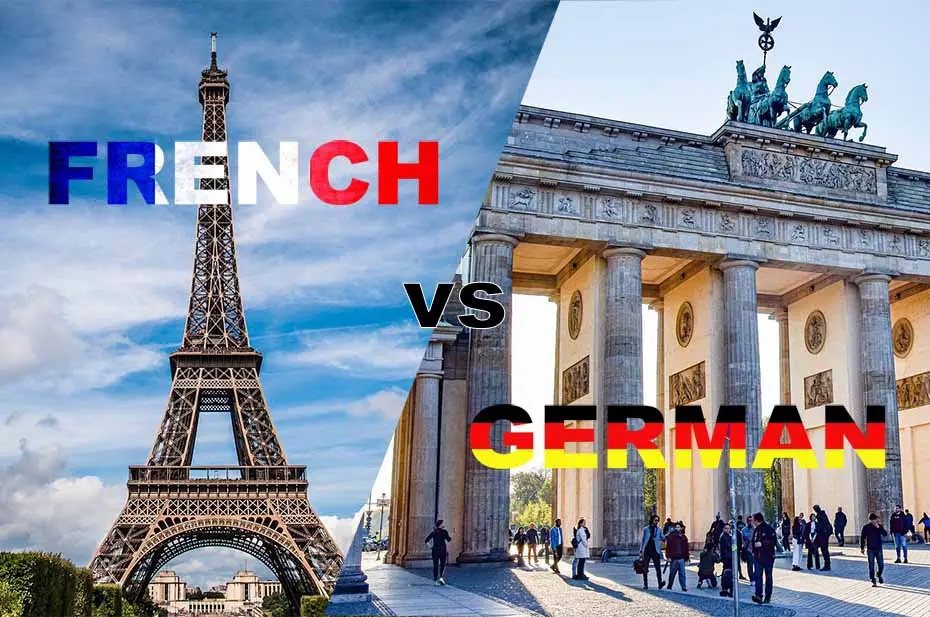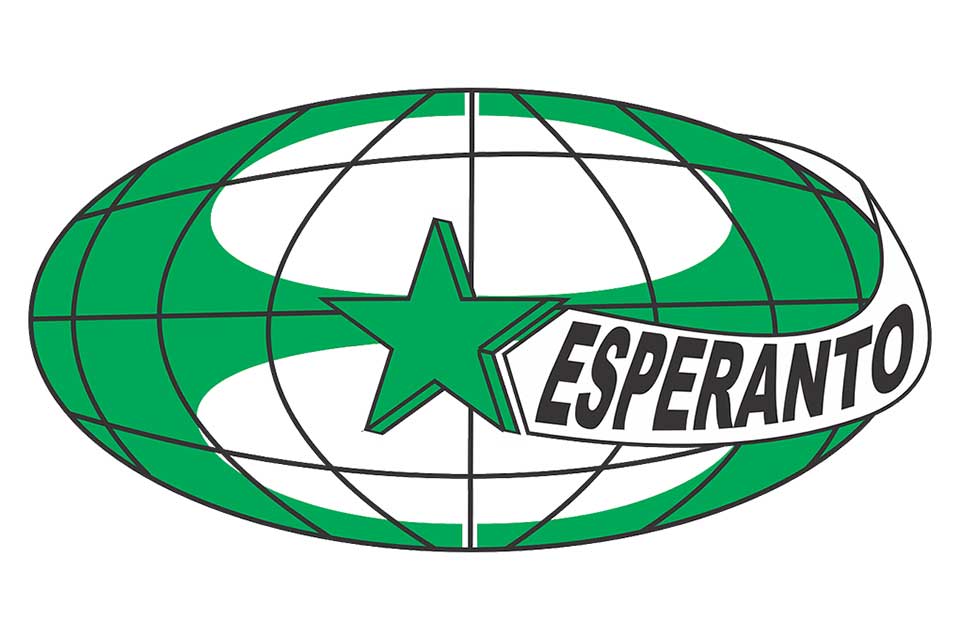For centuries France and Germany have been rivals, with both countries trying to dominate the European continent. But for the last seven decades they have been close allies, aiming to build a united and strong Europe. And despite their differences, there’s more that unites them than you might think. For starters the fact that France takes its name from a Germanic tribe, the Francs.
So, when it comes to taking sides which one should you choose? In today’s post it’s all about snails vs schnitzel, baguette vs pumpernickel, and champagne vs beer.

Should I learn French or German? – The Vocabulary
You want to learn a new language, and that’s great! But you are unsure whether French or German will be the right language for you? Both are widely spoken languages, not only in their own countries, but also in other parts of the world.
French Vocabulary
As it derived from Latin, the language of the old Roman Empire, French is one of the so-called Romance languages.
French Alphabet
The French alphabet consists of the 26 letters of basic Latin. There are also two ligatures with “æ” and “œ”, but these are often replaced with “ae” and “oe”, as computer keyboards usually don’t have these ligatures.
Furthermore the vowels are altered with four diacritics (the circumflex accent ^, the acute accent ´, grave accent `, the diaeresis ¨) and the cedilla, the little hook under a letter as in “ç” (e.g. in français).
So, basically it’s the same as the English alphabet, but with a few alterations.
French Nouns
All French nouns are either masculine or feminine, and their gender also determines the articles you have to use. Which makes learning the French language a bit more complicated for English Speakers. Let’s demonstrate the difference:
| English Articles | French Articles |
|---|---|
| the man | l’homme |
| the woman | la femme |
| the child | l’enfant |
| a man | un homme |
| a woman | une femme |
| a child | un enfant |
French Pronunciation
Pronunciation of French consonants is generally not a big problem. The h is silent, so instead of saying “hello” you just say “‘allo”.
And the “r” is pronounced like a rolling “r”.
More difficult are the vowels. Their pronunciation changes depending on whether they are stressed or unstressed, whether they are written with or without an accent, and when two vowels appear together, the pronunciation changes again.
German Vocabulary
Not surprisingly, the German language belongs to the large group of Germanic languages, as does English.
German Alphabet
Just like in French or English, the German alphabet consists of the 26 letters of basic Latin. But there are four more characters:
- the umlauts ä, ö, and ü
- and the ß (called the eszett)
Similar to the French ligatures, the umlauts can be replaced with ae, oe, ue, if you don’t have these characters on your keyboard.
German Nouns
If you thought having two genders for nouns is too much effort, the Germans can easily top that, as they have three: masculine, feminine and neuter.
Again, let’s demonstrate:
| English Articles | German Articles |
|---|---|
| the man | der Mann |
| the woman | die Frau |
| the child | das Kind |
| a man | ein Mann |
| a woman | eine Frau |
| a child | ein Kind |
French Grammar vs German Grammar
Grammar is the one thing most language students hate. Irregular verbs, the various tenses, prepositions to indicate places or times, nouns which have a grammatical gender, and for every rule there seems to be an exception. So, let’s investigate which language has the easier grammatical rules, French or German.
The French Grammar
As we already mentioned all French nouns have a gender. This makes the French grammar more complex than the English, as the articles and adjectives adapt to the respective gender.
The conjugation of French verbs is rather complex and one of the most difficult elements of French grammar to master. There are many tenses in French grammar and sometimes it is difficult even for advanced learners to know which tense is correct.
The German Grammar
In German grammar the articles and adjectives also adapt to the gender of a noun, but here we have three genders (masculine, feminine, and neuter) instead of just two as in French.
In the German language there is also a fairly large number of word forms. The correct ending of a noun and the right article depend on the gender, the case and the grammatical number of a noun. It’s not really hard to understand, but requires a bit more time when you want to learn German.
Conjugation of verbs is also pretty complex in the German language, but some of the times are very rarely used in everyday conversation. So unless you need them for a test, you can probably omit some of them.
One tricky thing is that the position of a verb within a sentence changes, depending on whether it is a subordinate clause or a main clause.

Which is more useful – French or German?
Let’s take a look at the numbers. There are an estimated 270 million French speakers in the world, of which only 80 million are native speakers. In Europe this includes people living in France, but also other French speaking countries such as parts of Switzerland, Belgium, Luxembourg, Monaco, and Andorra. But due to the colonial history of France, the French language can also be found in other parts of the world, e.g. Canada, 15 African countries, and the caribbean.
German, on the other hand, is the native language for about 105 million people and there are another 80 million people who speak German worldwide, which brings us to to a total number of 185 million people speaking German.
Most German speakers are found in Europe. In addition to Germany, Austria and Switzerland, there are other European countries where German is commonly used as an official language.
With 270 million people speaking French all over the world and “only” 185 million speaking German, you might think that French is the most important language in the European Union.
But it is actually the other way round! German is the native language of more than 20 percent of EU citizens and thus the most widely spoken mother tongue in the EU. In addition, more than 10 percent of Europeans speak German as a second or third language; that means a total of more than 30 percent of EU citizens speak German.
Before the Brexit, English was the most widely spoken language in the EU at 47 percent (13 percent native language, 34 percent foreign language), while French was in third place behind German at 23 percent (12 percent native language, 11 percent foreign language).
But even though the UK left the EU, English remains one of the official languages of the European Union. Together with, you guessed it, French and German!
Comparing the Countries
Let’s take a quick look at both countries to see which one suits you better.
France – Emperors and Revolutionaries
From a monarch who spent the equivalent of US$ 100 million on a single palace (Versailles) through a bloody revolution and back to a general who ruled most of Europe and declared himself emperor, the French history is rich in drama.
But it’s not only French politics that’s fascinating, but also its history in art, music, and literature. And of course, there’s the French cuisine renowned all over the world.
Learning French gives you the opportunity to explore a country of beautiful landscapes, from the snow-capped Alps in the north to the lavender fields in the south and the sunny beaches on the Mediterranean coast.
Germany – An economic Superpower
Germany has been one of the most important countries in Europe for centuries and has the fourth largest economy in the world. Learning German is a great way to gain access to this country and its culture, which is one of the most powerful and influential countries in Europe. German is a rich language with a long history; German has been spoken for centuries and has produced some of the world’s most famous authors, such as Goethe, Schiller and Hesse. In the 19th century, German was also the most important language in science. Just as today almost all scientific writings are published in English, it was common back then to publish scientific papers in German instead.
In addition, Germany has a rich culture that can be explored through literature, art, music and cuisine. Learning German opens up many opportunities for anyone who wants to get to know this fascinating country better.

Should I learn French or German – Conclusion
As you could see, both France and Germany are super powers in Europe. Both countries have a long history and rich culture, and if French is the language of love (as is often claimed), you could perceive German as the language of science and finance.
So, what are the scores in our language comparison? Should you rather learn French or German?
Worldwide, more people speak French than German, so that’s a point for French. (F 1 : G 0)
Let’s look at the vocabulary:
Both languages have the same characters as English with a few “add-ons.” So I’d say that’s one point each. (F 2 : G 1)
French pronunciation is tricky with many special rules, whereas German words are (almost) always pronounced the way they are written, so once you learned the basic rules, you are good to go. One point for Gryffindor, ah sorry — the German language. (F 2 : G 2)
And with German being a germanic language, it belongs to the same language family as English, so these two languages have more in common than English and French. Which makes another point for German. (F 2 : G 3)
On the other hand, the French grammar is a bit easier than the German one. So another point for France (F 3 : G 3).
Which leaves us with a draw. Well, I guess more comparisons can be made, but I would say in the end, it is a matter of personal preference which language you want to learn. Both are important European languages and I would go for the one which gives you a better feeling. Can you imagine yourself in a café in Paris, flirting with the waiter or waitress? Or do you rather see yourself on a German beer festival? Do you want to wander through an art gallery in France or rather listen to a Beethoven concert in Germany?
Choose the language (and country) which interests you more and which gives you a better feeling. Having a real interest in a subject makes learning it much easier! And when you are doing it only based on some analytical calculations, but aren’t really interested, you are much more likely to fail.
If you want to learn French or German, we recommend to take a look at our article on Babbel vs Pimsleur. Both are affordable language learning programs with which you can learn a language in the comfort of your home or on the go.




